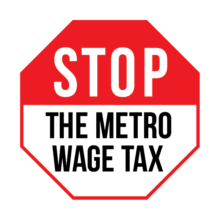New Independent Tax Study Reveals Metro Wage Tax Goes Far Beyond Wages
FOR IMMEDIATE RELEASE
September 16, 2020
Contact:
Jeff Reading
Communications Director, Stop the Metro Wage Tax
[email protected]
360-888-9520
PORTLAND – A new report from accounting firm Moss Adams reveals critical new information about Measure 26-218, the proposed tax on employers and non-profits appearing on the November ballot.
The report, released yesterday, reveals that the measure will tax not only wages, but will include employee benefits such as health insurance, contributions to retirement, bus pass allowances, and stock options.
“Obviously, we were shocked by the Moss Adams analysis,” said Deanna Palm, president of the Hillsboro Chamber of Commerce. “This analysis proves that this tax is beyond reasonable. We know this tax goes beyond wages and includes total compensation – which includes health care benefits – and it even goes beyond Metro government’s own boundaries. And beyond that, it’s very complex.”
The analysis found that the measure will tax employers and non-profits located outside Metro boundaries but who have workers who perform services inside Metro boundaries. The new Metro tax does not include the same clarity, limitations and exemptions as the existing payroll tax administered by Tri-Met.
“Metro has failed to tell the whole story about how far reaching this tax actually is,” said Lynn Snodgrass, CEO of the Gresham Area Chamber of Commerce. “The Metro government would have you believe that this tax is just on wages and on a limited number of businesses. That is simply not accurate. Moss Adams revealed that this tax also will be on health care benefits and retirement accounts. The only thing it won’t tax is the money you have hidden under your mattress.”
Snodgrass said Metro wrote the measure to give itself maximum flexibility with no restriction or limits on the tax rate, with the least amount of accountability, forever. “It is not a congestion tax. It is a funding stream.”
“The permanency and the complexities of this tax are beyond untenable for our businesses.,” said Lorraine Clarno, President & CEO, Beaverton Chamber of Commerce. “It is very clear from Moss Adams’ analysis that this is about a permanent revenue stream for Metro. The zoo and the convention center are revenue streams for the Metro government that have been hit hard. This is an opportunity for them to secure some of that lost revenue. What it will do to our businesses on Main Street – the metro area and beyond – will eliminate jobs at the worst possible time for our community.”
Video of today’s press call with Palm, Snodgrass, and Clarno can be found here.
The Moss Adams report can be viewed here.
